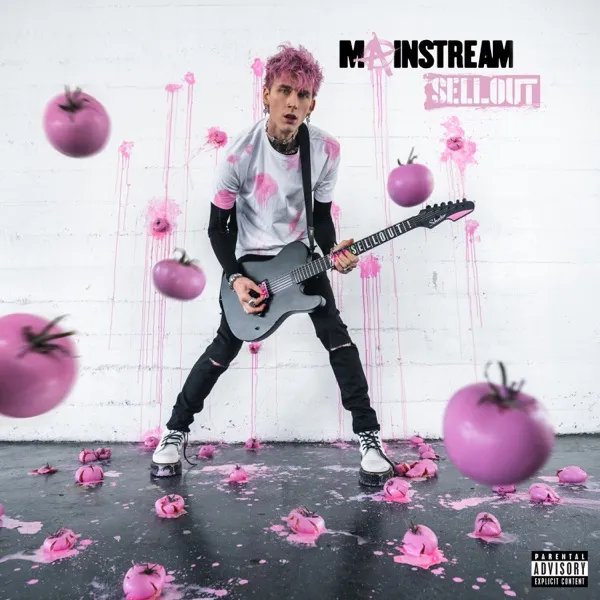Machine Gun Kelly’s “mainstream sellout” Tries to Prove His Talent, Yet Feels like a Parody of Itself
In light of major criticism of his first pop-punk record, Tickets To My Downfall, MGK’s new project tries to be self-aware, but is canceled out by the same, if not more, lackluster quality.

April 11, 2022
Within the last several years, Machine Gun Kelly has seen himself reach massive heights. Especially with a transition from rap to pop-punk, which led to a record that ended garnishing an incredible amount of attention, he saw the growth of a massive and diehard fanbase for his music. This transition, though, which seems to have come up from a diss track against MGK from none other than Eminem, has also received massive criticism both from critics and “pop-punk purists.” Essentially, a claim some people made in light of his pop-punk debut, Tickets to my Downfall, was this idea of MGK being a “poser” in the pop-punk scene. At least, that’s how this record examines these criticisms.
Though there are definitely people who haven’t let go of this need to effectively gatekeep pop-punk due to their personal nostalgia for the music, this argument is, in reality, not at all what is mainly being vocalized against him, and is also no where close to the biggest problem with MGK’s music (a point that will be elaborated on later in this review). The reason for this background is that, on this second installment in Machine Gun Kelly’s pop-punk transition, he decides to focus the record on proving that he “isn’t a poser” and “is a part of the scene.”
In spite of this being the main thesis of the album, there are actually a few other themes as well, which largely summarize the tracks on this LP. All of these ideas that MGK puts into his lyrics, though, all seem to come off in a drastically negative and hard to listen to way. He takes these themes, and then uses them to create a bigger picture of attempting to justify his punk attitude and status. The major problem here, though, is that this idea is, in and of itself, a non-starter. Instead of creating music for his fans, he is instead focusing all of his creative intent on people who are already not interested in his music. He, despite the massive mainstream success he’s seen, and even references directly in the title of this album, still seems to be feeling the need to justify himself to the people who still don’t like him. The end result of this is music that proves the exact opposite point that he’s trying to make by exposing his own insecurities over criticism.
Before breaking down the lyrics, which, in my view, are the key reason this album goes from listenable to borderline intolerable, there should be some emphasis on the instrumentals and sound design of this project. Machine Gun Kelly, for this project, has enlisted the help of Blink-182’s Travis Barker for the drums on this album. Many people who are very into modern rock music may recognize this as a trend, with Barker seemingly appearing on dozens upon dozens of various artists’ songs and albums, almost always coming out with mediocre-at-best production, often being carried solely by drums.
When it comes to the production on this record, mainstream sellout largely has the same problem, with some exceptions. The production throughout the majority of the songs here feel like the most watered down and painfully derivative versions of early 2000s pop punk you could imagine. Songs like “maybe” feel like a direct ripoff from Paramore’s “Misery Business;” “WW4” copies a lot of peak Blink-182 music, which isn’t surprising considering the Travis Barker cosign on this album; and even “twin flame,” the closer, feels like a cut-and-pasted version of Blink’s “I Miss You.”
Even with these problems, though, that’s not to say that the music here doesn’t have its bright spots. The guitars in “God save me” sound catchy, and many of the later tracks feature some atmospheric hip-hop sounds that, though incredibly by-the-numbers, serve their purpose of varying the pace of this album in a way that’s very well executed. Moments like these also give MGK some of his own, unique style at points, which is something that I wish was dug into way more throughout this project.
The hip-hop and rock blend on this album doesn’t stop at its sound, though, and blends itself into almost every portion of this album. Some parts of this album feature MGK rapping, even in spite of his transition (more on that later), and the utilization of features, including artists like Lil Wayne, felt like an interesting dynamic for this album to utilize. That is, of course, ignoring the risk of Lil Wayne returning to his awful Rebirth era, where he failed miserably at making his own rock transition. However, compliments to this album pretty much start and end here.
The biggest problem that this record faces, in all honesty, is Machine Gun Kelly himself. Almost every vocal performance on this album is mediocre at best, and miserable at worst. MGK tries to put on a stereotypical emo accent, which either feels boring and uninspired, or completely immature and annoying. When partnered with his lyrics, though, is when this album hits rock bottom.
Every song on this album, with, quite literally, no exceptions, falls into just a few categories, all of which feel incredibly toxic. Genuinely, there are some lyrical choices here that may be distressing, which some people may not want to listen to. MGK finds himself either:
- Point-blank listing off his life problems, to the point where it can feel like trauma dumping.
- Romanticizing drug use, while, at the same time, saying that it’s bad just a few tracks later, contradicting himself entirely and leaving his genuine opinions completely ambiguous.
- Romanticizing abusive relationships to a genuinely creepy degree.
Starting with the first point, Machine Gun Kelly finds himself, at many points throughout the album, feeling the need to justify his pop-punk aesthetic. Remember, this album’s main goal is to justify MGK, which is a problem that, even for an incredibly skilled lyricist, would be hard to tackle for an entire album runtime. For MGK, his solution, at many points, seems to be simply to list off his problems over and over throughout the album, in a way that feels almost manipulative. Saying outright, with no creativity, metaphor, or symbolism, his issues, including the death of his dad, suicidal thoughts, and drug abuse, creates a dynamic where he is attempting to get you to feel bad enough for him that he doesn’t have to receive these “poser” criticisms.
This also isn’t to say that nobody is allowed to be empathetic to his problems. Even in my dislike of the record, I genuinely feel for him at these moments. His emotions are completely real, and it’s not at all a positive thing to invalidate those emotions just because “pop-rock guy bad.” However, this use of his problems feel like they’re being used as an attempt to market himself as a messed-up person in order to appeal to emo and punk culture, rather than a genuine and serious attempt at reflection.
Past these points of self-hatred and listing out trauma, though, comes even more lyricism that seems to directly contradict himself by presenting the idea that his attempts at improving himself either aren’t fully genuine, or are being made up in order to, again, market himself as punk and emo. Notably, MGK continuously makes reference to his abuse of substances. The worst moment of this comes early on in the album, with the song “drug dealer,” where he is effectively crushing on the girl who gets him his drugs. The whole song focuses on his want to be with her, because of the fact that she also gives him the substances that get him high. Machine Gun Kelly literally comes off like the guy everybody was warned not to be peer pressured by in every anti-smoking campaign from the early 2000’s, which is almost funny to listen to at times.
The worst points, lyrically, though, are the moments where he is heavily romanticizing his unhealthy, abusive, and toxic relationships, in a way that is meant to portray them as “cool,” “punk,” and “exciting.” His obsession with these kinds of relationships are seen on many tracks, but especially on the seventh in the tracklist, where he goes on about a relationship where, despite having an abusive hatred for each other, still feel and enjoy intimate relations, all in a gut-wrenching amount of detail. Yet, he completely contradicts his feelings here on songs like “fake love don’t last,” where he then attempts to condemn this with a “I hate my ex” song that adds absolutely nothing unique to this trope. I wish I could see this as a way of him saying that this is him admitting that his relationship was bad, but then why would he word the first song in a way that portrayed these problems in a completely positive light, especially when the focus of this album seems to be using his problems to portray himself as punk-rock? He feels like he’s just vaguely contradicting himself for seemingly no reason other than an intense level of toxic indecisiveness.
And yet, somehow, this isn’t even the extent of his terrible lyricism throughout this album. The title track, for example, is him complaining about those same “poser” arguments, which, though are incredibly dumb, don’t feel any worse than MGK, someone who is over 30, feeling the need to insecurely respond to this argument by people with a significantly smaller platform. The most punk-rock thing MGK could have done here, rather, was to not acknowledge these people, and focus on making good music that appeals strictly to his audience, while inherently proving that he can make good music without being petty and pretentious about his issues.
His annoying attitude continues on the first single from this record, “papercuts,” where he, in the most stereotypical way possible, paints what feels like a parody of the punk attitude. He’s so wrapped up in justifying his attitude that he has to include the line “…don’t belong, I’m a punk” in the emo “I don’t care” growl that is almost instantly recognizable for its cringe-inducing sound. Towards the end of the song, though, he breaks into a rap verse with terrible line after terrible line.
Starting off, he says “y’all thought that I switched genres,” which, ignoring the pretentious “I’m-better-than-you” quality, isn’t even true. This is a pop-punk album, and you switched genres. Musicians can rap in songs that aren’t rap songs – artists like Twenty One Pilots, even, use rapping in their music, which is much better classified as alt-pop. So, yes, Machine Gun Kelly, you did, in fact, switch genres.
He also has the lyric “I’m a genius, coulda made Donda, but this song is to my dead father,” which not only is hilarious to hear him claim on a record that is hundreds of times less inspired than Ye’s Donda, but is also incredibly harmful, considering that he’s directly comparing his problems to that of someone else who’s notorious for his own problems, which again, feels as though he’s trying to market himself as “messed up.”
Despite all of my very major critiques of this album, I still am left coming away from this album feeling as though Machine Gun Kelly does have potential, which, I suppose, means that the album completed it’s goal of justification. I genuinely want to see MGK be able to see himself reach a better mental state, and allow himself to grow as a musician and as a person in a way that’s beneficial both to his creative process and his mentality even outside of music. However, as it stands currently, I’m left feeling as though MGK is less concerned with making good music, and more with, for lack of a better term, “owning his haters.” In order to see any genuine growth, he’ll have to stop these petty fights with people who don’t care about him anyway, and move on in a respectable manner.





Parker P. • Apr 22, 2022 at 1:39 pm
It seemed to me that even though I never followed MGK in his rap phase, he was always trying to step in Lil Peep’s footprints, whether it be with his look or in his lyrics. I wasn’t surprised when this article talked about lyrics romanticizing abusive relationships, as it is may be another thing MGK took out of peep’s book.
Didn’t even know that he made a transition to rock and was interesting to read about his recent failure.
Dylan G • Apr 22, 2022 at 1:33 pm
Yeah , he fell off when he dissed Eminem and his daughter.
Raj • Apr 22, 2022 at 1:25 pm
This article is an amazing take on this album. I love the way you point out the similarities between songs.